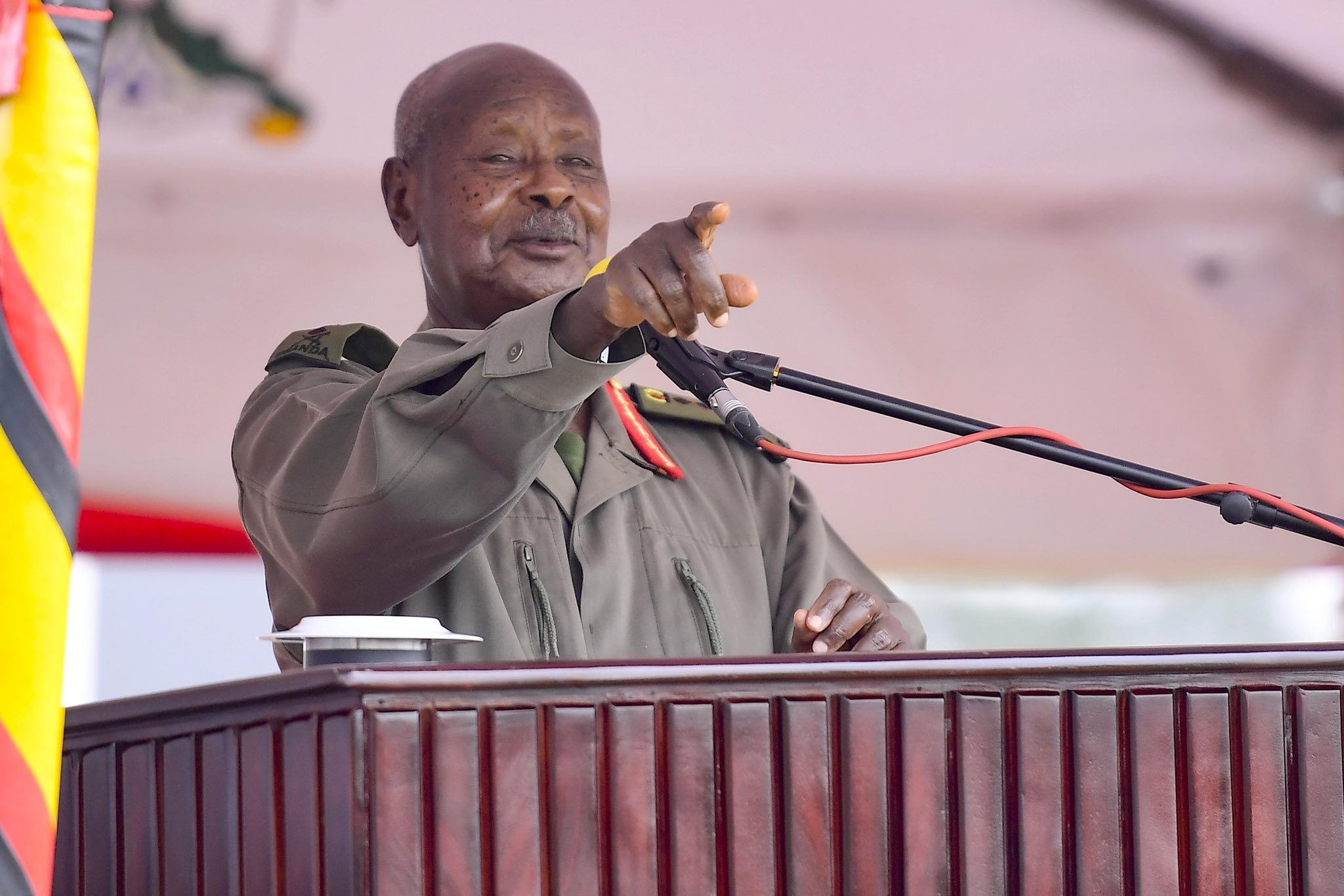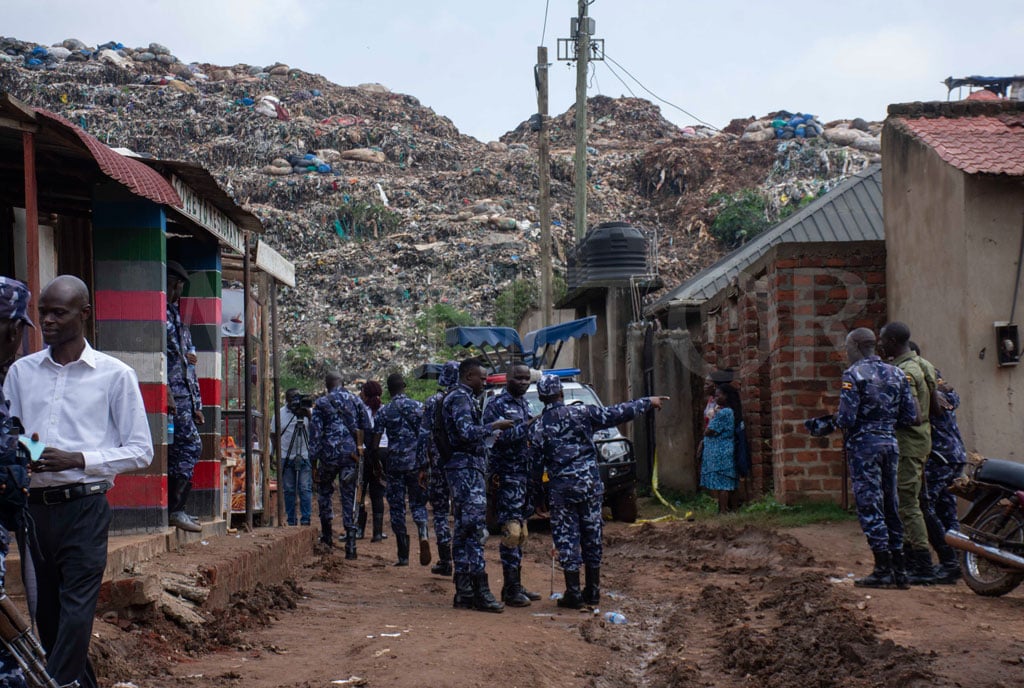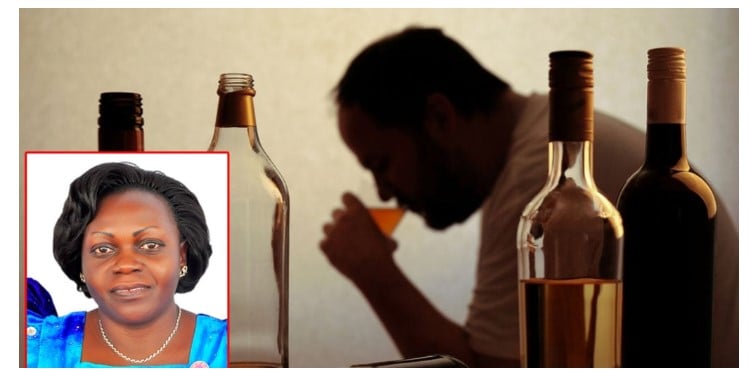
President Museveni gestures while addressing government officials during the Cabinet retreat at the National Leadership Institute, Kyankwanzi, last week. PHOTO | PPU
Endemic corruption has earned its place in Uganda as it permeates every pocket of society, from sacred places such as temples of justice to the cloistered halls of Ministries, Agencies and Departments as well-placed civil servants chase the gravy train.
A quick scan of audits by the Auditor General, Public Procurement and Disposal of Public Assets Authority (PPDA), and Inspectorate of Government (IG) indicates that public funds are siphoned through wastage and mismanagement, dubious expenditures, under collection of local revenues, persistent medicine stock-outs, and poor record keeping, among others.
Name any local government entity—district, municipal and town councils, or sub county—and check the Auditor General’s report of any year, the red flags always recur.
In central government, the plundering, squandering, and misspending of government money mostly manifests through procurement deals for goods and services. The IG says procurement officials plan to steal right from the planning stage, throughout the different phases, to the execution of the project.
But often, as soon as the audit or investigation reports are shared, everyone moves on.

Bunyole East MP Yusuf Mutembuli (left) and Lwengo District Woman MP Cissy Namujju, who are accused of budget corruption, at the Anti-Corruption Court in Kampala on June 17, 2024. PHOTO | FILE
According to Global Integrity, a Washington DC-based nonprofit organisation that tracks governance and corruption trends, the police, the Judiciary, and procurement are areas where corruption risks are very high and under-the-table cash payments are expected.
This, as those implicated in massive corruption scandals, often received a slap on the wrist and others were reappointed to coveted positions as long as they did not threaten the President’s power base. The rag-tag liberators of the country pontificated 39 years ago that corruption and other ills in society drove them to pick up arms to fight a costly war in the Luweero Triangle.
Elimination of corruption and misuse of power was point number seven in the initial National Resistance Movement (NRM) policy prescription—the 10-point programme. Decades after taking the reins and, exalted like nobles, men and women have replaced the lasting image of haggard and shabbily dressed commanders with expensive tastes.
The leaders traded their constituents as pawns in a clientele-patronage system as politicians and their surrogates became the wealthiest class in society while the ruled were pushed to the lowest rungs awaiting crumbs from their masters.
One does not need to conduct a lifestyle audit to prove how corrupt officials have amassed ill-gotten wealth.
The Inspector General of Government (IGG), Ms Beti Kamya, vouched for a lifestyle audit which for long had been met with both disdain and resistance.
However, during the commemoration of the Anti-Corruption Day on December 9, 2021, at Kololo Ceremonial Grounds, President Museveni told the IGG Kamya to halt plans to roll out a lifestyle audit, which would target sophisticated cartels of graft orchestrated by senior public servants and ministers.
“We are still lucky that our corrupt people are corrupt here, they steal the money, and put it here, you see a five-star hotel from corruption. Now if you only concentrate on the lifestyle, then they will take the money out and you will have no evidence here,” Mr Museveni said.
Inexplicably, at the same event the President had launched the lifestyle audit campaign as a new anti-corruption drive spearheaded by the ombudsman. Following the Head of State’s caution that day, the campaign suffered a stillbirth.
Speaking at the commemoration of the Anti-Corruption Day a year later in Ibanda District, IGG Kamya attempted a feeble defence: “We have spent the great part of this year working on a framework on which to operate the lifestyle audit and I want to assure the country that in a couple of months, the legal framework will be rolled out and we can roll out the lifestyle audit campaign.”
A stain they can’t wipe off
“You see, Mr Museveni is under siege in many respects. On the one hand, he will say he wants to fight corruption, but on the other, he seems to foster it, he seems to fuel it,” the Leader of the Opposition in parliament, Mr Joel Ssenyonyi told this newspaper in an interview last Wednesday.
He added: “Over the years in the past, people would get censured over corruption and then he would reinstate them. Overwhelming allegations against many of his government officials and then he brings them closer. So you cannot preach water and then drink wine and you expect people to take you seriously. No, it cannot happen.”
Past scandals
While the NRM found corruption and abuse of office at the highest and even after vowing to eradicate it as stated in the 10-point programme, about one month in office, the first scandal of abuse of office involving a civil servant unfolded when the General Manager of the defunct Uganda Airline, Dr Ben Ochola, ordered for a recall of the plane, which had been airborne for more than 30 minutes, back to the ground.
Then came the Santana vehicle saga, the worst corruption case in the late 1980s, to a floodgate of cases in the 1990s, from the gangster-style pillaging and stripping of Uganda Commercial Bank (UCB) to the opaque privatisation of state enterprises through auction, management buyout, asset and share sales, and transfer of ownership to the private sector, to billions of shillings pilfered in dubious deals, the Northern Uganda recovery aid, and the pension saga, among others, from 2000 to date.
Over the last few years, reports have abounded about tampering with appropriations in the national budget usually through connivance between MPs and technocrats in the Ministry of Finance.
This plundering reached a crescendo in May this year, weeks to the reading of the 2024/2025 financial year budget after it emerged that MPs had repurposed, reallocated or readjusted, Shs750b behind the back of Ministry Finance officials and after the budget had been passed.
Several MPs have been arrested, charged, and remanded as a result while several others are said to be under investigation. In the same vein, several officials have been charged with causing financial loss and conspiring to steal cooperative union cash.
The individuals under investigation are still innocent until proven guilty. But this does not erase the fact that billions of money were siphoned to private accounts.
In this year’s State-of-the-Nation address, President Museveni reechoed, for the umpteenth time, stamping out graft like never before.
“Task five, eliminate corruption in the public service and from among the political leaders. I have been getting good information about corrupt actors among the public servants but also among the political actors. With firm evidence, I will crush these traitors,” Mr Museveni.
Invariably, the President had always lamented that he cannot act if he is not availed with the names of suspects and cogent evidence.
Mr Ssenyonyi likened the rekindled efforts on graft to a scarecrow.
“The pillars that hold this government together are tainted with corruption. And so even Mr Museveni knows that if he is to seriously fight corruption, he will be fighting his government. It will crumble. And that’s why he told the IGG not to go so hard on the thieves because after all, they’re investing here. He knows them. For him to make that statement, he knows they’re very close to him. So we have to press the reboot button,” he said.
“Otherwise all these efforts are a drop in the ocean. It’s like washing your clothes and then you hang them out in the mud. There’s no progress,” he added.
The Executive Director of Anti-Corruption Coalition Uganda, Mr Marlon Agaba, said the President’s tough talking is an attempt to placate the corruption-fatigued public.
Old adage
“If you look at the President’s most recent comments, which indicate he is taking on corruption or trying to end it, he feels the need to say things like I’m not joking which sort of speaks to maybe a public trust issue whether he can actually address this problem,” Mr Agaba said.
He added: “He has that urge to fight corruption. He really wants to address the problem. But I think unfortunately for him he has woken up when it is somewhat late for him. I think when you look at the President from when he captured power in 1986, he had chances on several occasions to address corruption, when it was still emerging, in its infancy.”
In April 2005, the President, while launching the National Anti-Corruption Strategy, dismissed criticism of his government as lacking the political will to fight corruption.
“Who doubts my will? Isn’t my political will well-known? Didn’t I go with 27 people to fight an army of 40,000? Aren’t I the one who created the IGG? Isn’t the NRM that eradicated overt criminality like extra-judicial executions and others?” Mr Museveni was quoted as saying.
He went on: “What is now left is overt corruption like bribery, influence peddling, and embezzlement. We need new soldiers with integrity. Nobody else in Uganda controls money apart from permanent secretaries, the chief administrative officers, the town clerks, and the clerk to parliament. Why don’t these technocrats control the loss of money?”
Nineteen years later, the President has been on repeat mode with the same song. This, as the IGG has since put the estimate of monies lost to corruption annually to around Shs9 trillion.
In an interview with Daily Monitor, the programmes manager at Transparency International Uganda, Mr Gerald Padde Auku, concurred that “corruption in Uganda is increasing” and “it is systematic, entrenched and acceptable.”
“You cannot solve a problem by doing the wrong thing. A problem is solved by understanding its cause. Likewise, I expected the Executive through the President to understand the challenges of why these mainstream anti-corruption entities are not performing. That should be the starting point,” Mr Auku noted.
Year-in-year-out, the President has made a threat here and there. However, it was not until the arrest of MPs over alleged budget fraud in June and several said to be under investigation that the President walked the talk. Critics have argued that beyond rhetoric, he needs to offer pragmatism regarding combating this Achilles Heel.
In his address to ministers and permanent secretaries, the President urged the Judiciary to place corruption in the category of offenses that are not considered for bail.
Mr Ssenyonyi argued: “You see for starters, it’s selectively done and that is why many thieves in government do not feel intimidated in any way, especially those who are powerful, those who are connected. They know that it will not catch up with them.”
“But even for those who are arrested eventually, things fizzle out so the arrests will excite some Ugandans and you hear some people saying after all now the fight seems to be serious. But just try and follow up all these corruption allegations; look at Commonwealth Heads of Government Meeting (Chogm). How did it end?”
Wanton misdiagnosis?
Mr Auku said the establishment of more anti-graft agencies as an anti-dote is also unhelpful in the absence of political will.
“Because creating more entities is a cost to the taxpayer. These guys need offices. They need staff. They need bodyguards. They need cars. That is a cost. And yet at the same time, these mainstream entities, the IGG, the DPP, the police are saying they are not well facilitated to execute their mandates,” Mr Auku said in response to the recent creation of the State House Revenue Intelligence Unit, and the proposed two units to check on graft in the Office of the Auditor General and PPDA. In 2019, the President created the State House Anti-Corruption Unit with tasks similar to the IG.
“If it was diagnosed well, he wouldn’t be creating a piecemeal of other entities. And that makes coordination very difficult. They come with a lot of power because they know they report directly to the President. The checks and balances from the three arms of government are lacking,” he noted.
Mr Agaba argued that corruption is an animal too big for the President to tackle. “But this is a monster he left to grow. It has grown and it may not be easier for him to address now than when he had the chance to do that. Where is the problem because when you go to the Luzira, there are public officials who have been arrested for corruption but it doesn’t stop, Of course, we need to understand that the actions in proportion to the problem don’t add up when you look at the people being taken on average for most of the corruption scandals,” he said.
Like a pet subject, President Museveni and his technocrats have committed to tame graft, which according to a 2015 report by the Parliament, cost the country more than Shs24 trillion over the last 10 years.
Good laws and policies have been enacted as well as offices to fight graft. But often anti-graft Tsars appointed are jesters, too pliant to take action, selectively target and prosecute for political gain or if they go after regime cronies, they are sidelined.
Yet, as trillions of shillings are siphoned, the electorate continues to die as a result of negligible diseases, pupils take classes under trees and mothers give birth by the roadside creating one of the most uneven societies.








